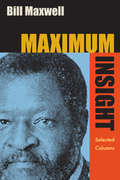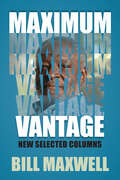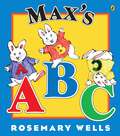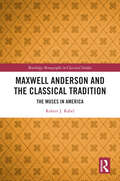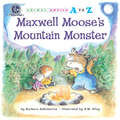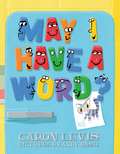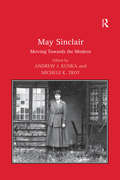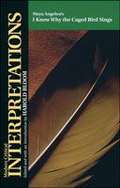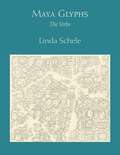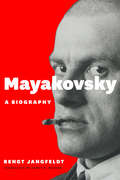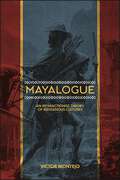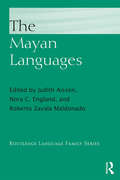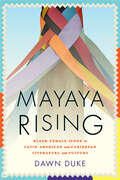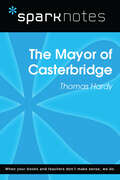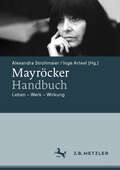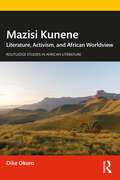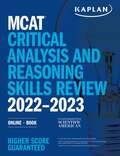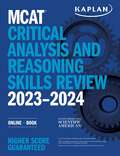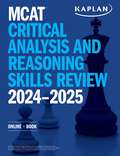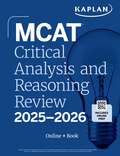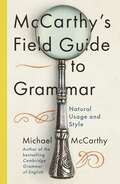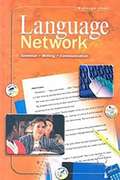- Table View
- List View
Maximum Insight: Selected Columns
by Bill Maxwell"One of the most distinctive and independent voices in American journalism . . . a voice that can inspire and infuriate . . . a voice that must not be ignored, especially if we Americans hope to create in this next century something that looks vaguely like a multi-racial, multi-ethnic democracy."--Roy Peter Clark, Poynter Institute, St. Petersburg"Maxwell’s level of erudition is unusual among columnists . . . he often alludes to history, philosophy, literature, and the social sciences as he puts the news of the day into context."--Sam G. Riley, professor of communication studies, Virginia Polytechnic Institute"An original and significant contribution to the literature of journalism and Florida culture."--Jay Black, Poynter-Jamison Chair in Media Ethics, University of South FloridaWith syndication in more than 200 newspapers and a faithful readership nationwide, Bill Maxwell’s status as one of the country’s preeminent black journalists is unquestionable. This collection of his columns, primarily from the St. Petersburg Times, forms a body of commentary on humanity (and lack of same) that will capture the hearts and minds of Americans. Maxwell covers a sweeping range of subjects, including race—a central but not exclusive theme. He asks hard questions that courageously attempt to understand hatred and injustice in America; and he takes on controversial issues many columnists avoid and a wide spectrum of national figures—from Jeb, George W. and Clarence Thomas to the Pope and Jesse Jackson. Maxwell writes movingly about his childhood as the son of migrant farm workers in rural Florida, his love of books—beginning with those plucked from garbage cans—and his everyday encounters with the white world and the black one. With a voice that is provocative and insights that are deep and passionate, he tackles the plight of migrant workers, the devastation of the environment, religious intolerance, homophobia, affirmative action, illiteracy, public education, civic responsibility, politics—and racism. He criticizes blacks and whites alike in his search for truth and right, especially in his exploration of what he calls "resurgent bigotry and Republicanism" and "the black writer’s most agonizing task—and duty—being dispassionate about the foibles and self-destructive behavior of African-Americans." Setting a standard for the newspaper column as social criticism, Maximum Insight illuminates the role of the black writer as an interpreter of the forces that define a diverse America.Bill Maxwell writes a twice-weekly column for the St. Petersburg Times. Syndicated by the New York Times News Service and by Scripps-Howard, his columns appear in 200 newspapers worldwide and have received many writing awards, including the Florida Press Club’s plaque for general excellence in commentary twice in and the Community Champion Award from the American Trial Lawyers Association.
Maximum Vantage: New Selected Columns
by Bill MaxwellA veteran journalist speaks truth to power on issues that matter to the nation In this collection of columns spanning the years 2000-2019, veteran journalist Bill Maxwell tackles important issues faced by Florida and broader American society that remain as relevant as ever. Demonstrating the courage to take on controversy and the signature pithy style that have won him a nationwide readership, Maxwell offers his opinion on a wide variety of questions with a focus on race, agricultural labor, education, and the environment. Maxwell writes from the vantage point of a Florida native who grew up as a migrant farmworker at the end of the Jim Crow era; a Black man who participated in the civil rights movement to help make the state more equitable; a college professor who lectured about the harms of racial discrimination; and an environmentalist who has lived in the Everglades as artist-in-residence. Grounding his social criticism in firsthand knowledge of the contradictions of life in the American South, Maxwell uses reason and research to highlight uncomfortable realities and injustices that persist in the twenty-first century.Believing that informed citizens will make decisions that positively impact society, Maxwell prompts readers to examine their own perspectives, question their assumptions, and come to a deeper understanding of their state and nation. Publication of this work made possible by a Sustaining the Humanities through the American Rescue Plan grant from the National Endowment for the Humanities.
Max's ABC (Max and Ruby)
by Rosemary WellsEverybody’s favorite bunnies, Max and Ruby, are back, starring in their very own ABC concept book. Max’s ants have escaped from their farm, and now they’re searching for food. The ants start with Max’s sandwich, and soon they’re everywhere! Fortunately, Ruby comes to the rescue.Max’s ABC teaches the alphabet by featuring a different letter on each page, large and colorful so they’re easy to spot. The very youngest readers will love practicing their letters with Max and Ruby.
Maxwell Anderson and the Classical Tradition: The Muses in America (Routledge Monographs in Classical Studies)
by Robert J. RabelThis book sheds new light on the dramatic works of the American playwright, poet, and lyricist Maxwell Anderson, assessing the pervasive influence of Greek and Roman antiquity on his plays that dominated Broadway in the first half of the twentieth century.Anderson is an important, though often forgotten, figure in the history of American drama and the Classical Tradition. The book highlights Anderson’s remarkably creative use of classical antiquity, while also illustrating how he served as a first-hand witness and reactor to some of the main social and political events of his time. It explores Anderson’s major theatrical works and adaptations of ancient Greek drama and poetry, including Winterset, The Winged Victory, the never-published Ulysses Africanus, and Bad Seed, as well as his later minor works. Anderson found in tragedians such as Aeschylus, Sophocles, and Euripides ideal models for the dramatic portrayal of human emotion amidst the social and political backdrop of the United States from the interwar period to the nuclear age, which this book seeks to explore at length for the first time.This volume is of interest to students and scholars of Classical Reception and the Classical Tradition, as well as those working on twentieth century American literature, drama, history, and politics.
Maxwell Moose's Mountain Monster (Animal Antics A to Z)
by Barbara deRubertisMaxwell Moose loves camping out and making s’mores and telling spooky stories. But what if Maxwell’s imaginary Mountain Monster stories aren’t as imaginary as he thought?
May I Have a Word?
by Caron LevisA battle of the magnet letters ensues across the refrigerator door in May I Have a Word? when C and K get into a fight about who gets to start the cooler (kooler?) words. When the two letters storm off in opposite directions, everything is turned upside down. SOCKS are now SO, there aren't any CLOCKS to TICK or TOCK, and the world is just out of LUCK--until other letters work to bring C and K back together again.
May Sinclair: Moving Towards the Modern
by Michele K. TroyMay Sinclair was a central figure in the modernist movement, whose contribution has long been underacknowledged. A woman of both modern and Victorian impulses, a popular novelist who also embraced modernist narrative techniques, Sinclair embodied the contradictions of her era. The contributors to this collection, the first on Sinclair's career and writings, examine these contradictions, tracing their evolution over the span of Sinclair's professional life as they provide insights into Sinclair's complex and enigmatic texts. In doing so, they engage with the cultural and literary phenomena Sinclair herself critiqued and influenced: the evolving literary marketplace, changing sexual and social mores, developments in the fields of psychology, the women's suffrage movement, and World War I. Sinclair not only had her finger on the pulse of the intellectual and social challenges of her time, but also she was connected through her writing with authors located in diverse regions of literary modernism's social web, including James Joyce, Ezra Pound, Ford Madox Ford, Charlotte Mew, and Dorothy Richardson. The volume is a crucial contribution to our understanding of the political, social, and literary currents of the modernist period.
Maya Angelou's I Know Why the Caged Bird Sings: A Casebook
by Joanne M. BraxtonThis casebook presents documents relating to Maya Angelou's Autobiographical work I Know Why the Caged Bird Sings. The casebook discusses the historical context and reception providing representative critical essays dealing with its psychological, sociological, and literary context. There is also an interview with the author, and a selected bibliography. Through reading this book, people can come to a fuller understanding of I Know Why the Caged Bird Sings and the unique aspects of the American ethnic, racial, and cultural experiences that this contemporary masterpiece portrays.
Maya Angelou's I Know Why the Caged Bird Sings (Modern Critical Interpretations)
by Harold BloomSelected essays on Angelou's book.
Maya Glyphs: The Verbs
by Linda ScheleThe key to the study of the language and history of the Classic Maya (A. D. 293-900) is the verb. Maya Glyphs: The Verbs is a comprehensive study of the verb morphology and syntax of the Maya writing system. Linda Schele's summary of methodology makes available in a single place many important discoveries and approaches to the Maya language. Hers is the first sourcebook to include so broad a range of dates and to identify for the first time so many Maya rulers and events. The admirably lucid text provides an excellent introduction to Maya hieroglyphics for the beginner, and, for the experienced Mayanist, it offers a fascinating explanation of methodology, including paraphrasing, and important information about syntactical structures, special verbal constructions, and literary conventions. Schele's extensive catalog of known verbal phrases is useful for a variety of purposes. Because it is organized according to verbal affix patterns, it provides the only available source for the distribution of such patterns in the writing system. At the same time it registers the date of each event, its agent and patient (if recorded), the dedication date of the monument on which the glyphs occur, and a pictorial illustration, rather than a T-number transcription, of each example. Extensive notes treating problems of dating, interpretation, and dynastic information contain theories about the meaning and function of the events recorded in the Maya inscriptions. The key to the study of the language and history of the Classic Maya (A. D. 293-900) is the verb. Maya Glyphs: The Verbs is a comprehensive study of the verb morphology and syntax of the Maya writing system. Linda Schele's summary of methodology makes available in a single place many important discoveries and approaches to the Maya language. Hers is the first sourcebook to include so broad a range of dates and to identify for the first time so many Maya rulers and events. The admirably lucid text provides an excellent introduction to Maya hieroglyphics for the beginner, and, for the experienced Mayanist, it offers a fascinating explanation of methodology, including paraphrasing, and important information about syntactical structures, special verbal constructions, and literary conventions. Schele's extensive catalog of known verbal phrases is useful for a variety of purposes. Because it is organized according to verbal affix patterns, it provides the only available source for the distribution of such patterns in the writing system. At the same time it registers the date of each event, its agent and patient (if recorded), the dedication date of the monument on which the glyphs occur, and a pictorial illustration, rather than a T-number transcription, of each example. Extensive notes treating problems of dating, interpretation, and dynastic information contain theories about the meaning and function of the events recorded in the Maya inscriptions.
Mayakovsky
by Bengt Jangfeldt Harry D. WatsonFew poets have led lives as tempestuous as that of Vladimir Mayakovsky. Born in 1893 and dead by his own hand in 1930, Mayakovsky packed his thirty-six years with drama, politics, passion, and--most important--poetry. An enthusiastic supporter of the Russian Revolution and the emerging Soviet State, Mayakovsky was championed by Stalin after his death and enshrined as a quasi-official Soviet poet, a position that led to undeserved neglect among Western literary scholars even as his influence on other poets has remained powerful. With Mayakovsky, Bengt Jangfeldt offers the first comprehensive biography of Mayakovsky, revealing a troubled man who was more dreamer than revolutionary, more political romantic than hardened Communist. Jangfeldt sets Mayakovsky’s life and works against the dramatic turbulence of his times, from the aesthetic innovations of the pre-revolutionary avant-garde to the rigidity of Socialist Realism and the destruction of World War I to the violence--and hope--of the Russian Revolution, through the tightening grip of Stalinist terror and the growing disillusion with Russian communism that eventually led the poet to take his life. Through it all is threaded Mayakovsky’s celebrated love affair with Lili Brik and the moving relationship with Lili’s husband, Osip, along with a brilliant depiction of the larger circle of writers and artists around Mayakovsky, including Maxim Gorky, Viktor Shklovsky, Alexander Rodchenko, and Roman Jakobson. The result is a literary life viewed in the round, enabling us to understand the personal and historical furies that drove Mayakovsky and generated his still-startling poetry. Illustrated throughout with rare images of key characters and locations, Mayakovsky is a major step in the revitalization of a crucial figure of the twentieth-century avant-garde.
Mayalogue: An Interactionist Theory of Indigenous Cultures (SUNY series, Trans-Indigenous Decolonial Critiques)
by Victor MontejoIn Mayalogue, Native Mayan scholar Victor Montejo provides an alternative reading and interpretation of cultures, challenging Western ethnocentric approaches that have marginalized Native knowledge and worldviews in the past. He proposes instead a methodology for studying culture as a unified whole, a radical departure from the compartmentalized sections of knowledge recognized by Western scientific tradition. Offering a strong critique of traditional anthropological studies, with its terms and categories that have denigrated Indigenous cultures throughout the centuries, Montejo's postcolonial work aims to dismantle the colonialist construction of Indigenous cultures, giving way to a Native approach that balances insider and outsider descriptions of a particular culture. Developed from an Indigenous Maya perspective, Mayalogue is a contribution to the dialogue between Indigenous and non-Indigenous scholars, students, and general audiences in the social sciences and humanities, and will be an essential text in decolonizing the minds of those who engage in the study of cultures anywhere in the world in the twenty-first century.
The Mayan Languages
by Judith Aissen Nora C. England Roberto Zavala MaldonadoThe Mayan Languages presents a comprehensive survey of the language family associated with the Classic Mayan civilization (AD 200–900), a family whose individual languages are still spoken today by at least six million indigenous Maya in Mexico, Guatemala, Belize, and Honduras. This unique resource is an ideal reference for advanced undergraduate and postgraduate students of Mayan languages and linguistics. Written by a team of experts in the field, The Mayan Languages presents in-depth accounts of the linguistic features that characterize the thirty-one languages of the family, their historical evolution, and the social context in which they are spoken. The Mayan Languages: provides detailed grammatical sketches of approximately a third of the Mayan languages, representing most of the branches of the family; includes a section on the historical development of the family, as well as an entirely new sketch of the grammar of "Classic Maya" as represented in the hieroglyphic script; provides detailed state-of-the-art discussions of the principal advances in grammatical analysis of Mayan languages; includes ample discussion of the use of the languages in social, conversational, and poetic contexts. Consisting of topical chapters on the history, sociolinguistics, phonology, morphology, syntax, semantics, discourse structure, and acquisition of the Mayan languages, this book will be a resource for researchers and other readers with an interest in historical linguistics, linguistic anthropology, language acquisition, and linguistic typology.
Mayaya Rising: Black Female Icons in Latin American and Caribbean Literature and Culture
by Dawn DukeWho are the Black heroines of Latin America and the Caribbean? Where do we turn for models of transcendence among women of African ancestry in the region? In answer to the historical dearth of such exemplars, Mayaya Rising explores and celebrates the work of writers who intentionally center powerful female cultural archetypes. In this inventive analysis, Duke proposes three case studies and a corresponding womanist methodology through which to study and rediscover these figures. The musical Cuban-Dominican sisters and former slaves Teodora and Micaela Ginés inspired Aida Cartagena Portalatin’s epic poem Yania tierra; the Nicaraguan matriarch of the May Pole, “Miss Lizzie,” figures prominently in four anthologies from the country’s Bluefields region; and the iconic palenqueras of Cartagena, Columbia are magnified in the work of poets María Teresa Ramírez Neiva and Mirian Díaz Pérez. In elevating these figures and foregrounding these works, Duke restores and repairs the scholarly record.
Mayor of Casterbridge (SparkNotes Literature Guide Series)
by SparkNotesMayor of Casterbridge (SparkNotes Literature Guide) by Thomas Hardy Making the reading experience fun! Created by Harvard students for students everywhere, SparkNotes is a new breed of study guide: smarter, better, faster. Geared to what today's students need to know, SparkNotes provides: *Chapter-by-chapter analysis *Explanations of key themes, motifs, and symbols *A review quiz and essay topicsLively and accessible, these guides are perfect for late-night studying and writing papers
Mayröcker-Handbuch: Leben – Werk – Wirkung
by Alexandra Strohmaier Inge ArteelDieses Handbuch stellt das erste Nachschlagewerk zur Weltliteratin Friederike Mayröcker dar, die in ihrer enormen Produktivität ein nahezu unüberschaubares Œuvre vorgelegt hat. Ihr oft als komplex charakterisiertes Werk wird anhand von Einzeldarstellungen der wichtigsten Lyrik- und Prosabände präsentiert und durch Beiträge zu poetischen Motiven und Verfahren näher beleuchtet. Untersuchungen zu Mayröckers Fortschreibung literarischer und künstlerischer Traditionen verorten das Werk im kulturellen Kontext. Gerahmt wird der Fokus auf das Werk durch Beiträge zum Leben und zur Wirkung der Autorin. Sie geben einen Überblick über Mayröckers Schreibleben und ihre Inszenierungen von Autorschaft, über die intermedialen Bearbeitungen ihrer Texte in Form von Vertonungen, Visualisierungen und Theateraufführungen, über ihre Rezeption im Feuilleton sowie die Übersetzungen im angloamerikanischen, französischen, italienischen, spanischen und russischen Sprachraum. Nicht zuletzt mit den Materialien im Anhang, darunter eine Auswahlbibliographie und eine Übersicht über die Archivbestände, bildet das Handbuch ein unverzichtbares Nachschlagewerk für Mayröcker-Kenner/innen und alle, die es werden wollen.
Mazisi Kunene: Literature, Activism, and African Worldview (Routledge Studies in African Literature)
by Dike OkoroThis book examines the life and work of Mazisi Kunene, the only recognized poet laureate of Africa, a Nobel Prize nominee, and a key symbol of African cultural independence. Kunene is widely recognized for his epic poems that assert cultural identity and condemn the disruption of the growth and development of African culture through colonialism/postcolonialism. This book explores how ‘oraliterature’ and cultural traditions informed Kunene’s poetry, how Kunene’s poetry highlights African women and mothers, and how activism, mythology and transnational identities are depicted in his verse to promote cultural and generational continuities from Africa to the Diasporic Africans. Drawing on a range of interviews and comparative studies, the book situates Kunene’s work in a wider conversation about South African social struggles. This book is an important contribution to our understanding of one of the giants of African literary history. As such, it will be of interest to researchers across African literary and postcolonial studies.
MCAT Critical Analysis and Reasoning Skills Review 2022-2023: Online + Book (Kaplan Test Prep)
by Kaplan Test PrepKaplan&’s MCAT Critical Analysis and Reasoning Skills Review 2022–2023 offers an expert study plan, detailed subject review, and hundreds of online and in-book practice questions—all authored by the experts behind the MCAT prep course that has helped more people get into medical school than all other major courses combined. Prepping for the MCAT is a true challenge. Kaplan can be your partner along the way—offering guidance on where to focus your efforts and how to organize your review. This book has been updated to match the AAMC&’s guidelines precisely—no more worrying about whether your MCAT review is comprehensive!The Most PracticeMore than 100 questions in the book and access to even more online—more practice than any other MCAT CARS book on the market.The Best PracticeComprehensive CARS subject review is written by top-rated, award-winning Kaplan instructors.Expanded content review for research design and the execution of research, and data-based and statistical analysis.All material is vetted by editors with advanced science degrees and by a medical doctor.Online resources, including a full-length practice test, help you practice in the same computer-based format you&’ll see on Test Day.Expert GuidanceWe know the test: The Kaplan MCAT team has spent years studying every MCAT-related document available. Kaplan&’s expert psychometricians ensure our practice questions and study materials are true to the test.
MCAT Critical Analysis and Reasoning Skills Review 2023-2024: Online + Book (Kaplan Test Prep)
by Kaplan Test PrepKaplan&’s MCAT Critical Analysis and Reasoning Skills Review 2023–2024 offers an expert study plan, detailed subject review, and hundreds of online and in-book practice questions—all authored by the experts behind the MCAT prep course that has helped more people get into medical school than all other major courses combined.Prepping for the MCAT is a true challenge. Kaplan can be your partner along the way—offering guidance on where to focus your efforts and how to organize your review. This book has been updated to match the AAMC&’s guidelines precisely—no more worrying about whether your MCAT review is comprehensive!The Most PracticeMore than 100 questions in the book and access to even more online—more practice than any other MCAT CARS book on the market.The Best PracticeComprehensive CARS subject review is written by top-rated, award-winning Kaplan instructors.All material is vetted by editors with advanced science degrees and by a medical doctor.Online resources, including a full-length practice test, help you practice in the same computer-based format you&’ll see on Test Day.Expert GuidanceWe know the test: The Kaplan MCAT team has spent years studying every MCAT-related document available. Kaplan&’s expert psychometricians ensure our practice questions and study materials are true to the test.
MCAT Critical Analysis and Reasoning Skills Review 2024-2025: Online + Book (Kaplan Test Prep)
by Kaplan Test PrepKaplan&’s MCAT Critical Analysis and Reasoning Skills Review 2024-2025 offers an expert study plan, detailed subject review, and hundreds of online and in-book practice questions—all authored by the experts behind the MCAT prep course that has helped more people get into medical school than all other major courses combined.Prepping for the MCAT is a true challenge. Kaplan can be your partner along the way—offering guidance on where to focus your efforts and how to organize your review. This book has been updated to match the AAMC&’s guidelines precisely—no more worrying about whether your MCAT review is comprehensive!The Most PracticeMore than 100 questions in the book and access to even more online—more practice than any other MCAT CARS book on the market.The Best PracticeComprehensive CARS subject review is written by top-rated, award-winning Kaplan instructors.All material is vetted by editors with advanced science degrees and by a medical doctor.Online resources, including a full-length practice test, help you practice in the same computer-based format you&’ll see on Test Day.Expert GuidanceWe know the test: The Kaplan MCAT team has spent years studying every MCAT-related document available. Kaplan&’s expert psychometricians ensure our practice questions and study materials are true to the test.
MCAT Critical Analysis and Reasoning Skills Review 2025-2026: Online + Book (Kaplan Test Prep)
by Kaplan Test PrepKaplan&’s MCAT Critical Analysis and Reasoning Skills Review 2024-2025 offers an expert study plan, detailed subject review, and hundreds of online and in-book practice questions—all authored by the experts behind the MCAT prep course that has helped more people get into medical school than all other major courses combined.Prepping for the MCAT is a true challenge. Kaplan can be your partner along the way—offering guidance on where to focus your efforts and how to organize your review. This book has been updated to match the AAMC&’s guidelines precisely—no more worrying about whether your MCAT review is comprehensive!The Most PracticeMore than 100 questions in the book and access to even more online—more practice than any other MCAT CARS book on the market.The Best PracticeComprehensive CARS subject review is written by top-rated, award-winning Kaplan instructors.All material is vetted by editors with advanced science degrees and by a medical doctor.Online resources, including a full-length practice test, help you practice in the same computer-based format you&’ll see on Test Day.Expert GuidanceWe know the test: The Kaplan MCAT team has spent years studying every MCAT-related document available. Kaplan&’s expert psychometricians ensure our practice questions and study materials are true to the test.
McCarthy's Field Guide to Grammar: Natural English Usage and Style
by Michael McCarthyYou ain't gonna like it: bad grammar's not so bad. - The TimesRemember all those grammar rules from school? No? Most of us don't. Mike McCarthy, renowned corpus linguist and co-author of the 900-page Cambridge Grammar of English answers the awkward questions that regularly bother us about English grammar. In this helpful A-Z field guide, McCarthy tells us what the conventional rules are as well as shows us what people are writing or saying now and gives simple reasons why you might choose one or the other so that you can speak and write with confidence.Through witty and entertaining examples pulled from 50 years of teaching, 40 years of field notes picked from books, newspapers, letters, radio and TV, etc., and shamelessly eavesdropping on people's conversations in public spaces, and a British and American English computer database, McCarthy has created a book to browse and enjoy, as well as a useful reference to keep on your bookshelf.Why a Field Guide to grammar?- A to Z format makes it easy to access and to find what you're looking for- Presents solutions to a host of common, everyday grammatical problems- References current events to bring relevance to the grammar (fronted adverbials anyone?)- Looks at historical usage to illustrate how the English language has evolved, and continues to evolve- Gives guidance on appropriate usage where more than one way of saying something exists- Distinguishes between spoken and written grammar where appropriate- includes advice on vocabulary, spelling, pronunciation, punctuation and style- Compares North American and British grammar, and includes Englishes from around the world- Charming drawings to illustrate the playfulness in the English language- Grammar guide backed by data and researchTrue to the Chambers name, this field guide is as much quirky as it is informative. It is the perfect gift for any language lover, student, teacher, struggling parent or carer supporting their child's schooling, the grammar purist or the grammar descriptivist.
McCarthy's Field Guide to Grammar: Natural English Usage and Style
by Michael McCarthyYou ain't gonna like it: bad grammar's not so bad. - The TimesRemember all those grammar rules from school? No? Most of us don't. Mike McCarthy, renowned corpus linguist and co-author of the 900-page Cambridge Grammar of English answers the awkward questions that regularly bother us about English grammar. In this helpful A-Z field guide, McCarthy tells us what the conventional rules are as well as shows us what people are writing or saying now and gives simple reasons why you might choose one or the other so that you can speak and write with confidence.Through witty and entertaining examples pulled from 50 years of teaching, 40 years of field notes picked from books, newspapers, letters, radio and TV, etc., and shamelessly eavesdropping on people's conversations in public spaces, and a British and American English computer database, McCarthy has created a book to browse and enjoy, as well as a useful reference to keep on your bookshelf.Why a Field Guide to grammar?- A to Z format makes it easy to access and to find what you're looking for- Presents solutions to a host of common, everyday grammatical problems- References current events to bring relevance to the grammar (fronted adverbials anyone?)- Looks at historical usage to illustrate how the English language has evolved, and continues to evolve- Gives guidance on appropriate usage where more than one way of saying something exists- Distinguishes between spoken and written grammar where appropriate- includes advice on vocabulary, spelling, pronunciation, punctuation and style- Compares North American and British grammar, and includes Englishes from around the world- Charming drawings to illustrate the playfulness in the English language- Grammar guide backed by data and researchTrue to the Chambers name, this field guide is as much quirky as it is informative. It is the perfect gift for any language lover, student, teacher, struggling parent or carer supporting their child's schooling, the grammar purist or the grammar descriptivist.
McDougal Littell Language Network: Grammar, Usage, and Mechanics Workbook
by Mcdougal LittellThis Grammar, Usage, and Mechanics Workbook contains a wealth of skill-building exercises.
